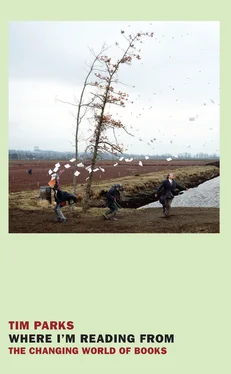“Do you think your move to Italy altered the way you think and write?”
“Has it been useful for you as an author to translate as well?”
“Does your wife read your books and if so what does she think of them?”
None of these questions are directly addressed to the novel you are presenting. Yet one has to grant that if one only knew the answers, something would be learned. The public are firing shots in the dark; they are groping for some kind of connection between the figure on the stage and the particular atmosphere of the novels they have read. A disturbing atmosphere. A heartening atmosphere. Or disturbing and heartening, and funny and decidedly unfunny. Why so? Who are you, to be producing this stuff? That’s what they’re asking. The irony perhaps is that what’s mysterious to them is even more mysterious to you. Yet even as you try and inevitably fail to answer their questions you are probably telling them more, in your perplexity and frustration, or your wryness and charm, than you ever could have by explaining your book.
“WHO IS THE most memorable character in the novels of the twentieth century?”
It’s a typical radio ploy to fill some mental space on a Saturday morning. Dutifully, people phone in. Studio guests discuss their choices. The obvious: Leopold Bloom, Gatsby. The wry: Jeeves, Sir Peter Wimsey. To select Proust’s unnamed narrator of In Search of Lost Time indicates a certain sophistication. Somebody, not a child, proposes Harry Potter. Then Miss Marple, Svevo’s Zeno, James Bond, Gustav von Aschenbach, Richard Hannay. People are telling us about themselves of course. They want to talk about themselves. There’s no question of our establishing whether Frodo Baggins is really more influential than José Arcadio Buendía or Bellow’s Herzog. But Sherlock Holmes can be safely ruled out because he first appears in the nineteenth century and Lisbeth Salander because she doesn’t turn up until 2005.
I can’t be bothered to think of a name myself. I resist these games—the most this, the best that. Surely these characters are all actors in a grand cast; they all have their roles in the larger drama of the collective psyche. But now suddenly it occurs to me that by far the main protagonist of twentieth-century literature must be the chattering mind, which usually means the mind that can’t make up its mind, the mind postponing action in indecision and, if we’re lucky, poetry.
There were plenty of forewarnings. Hamlet is the most notable. To take action would be to confirm his identity as his father’s son, his father’s avenger, but Hamlet thinks too precisely on the event, he’s too smart, and so fails to become anyone at all, either his father’s son or Ophelia’s husband. He suffers for that failure and spins out unhappy procrastination in fine poetry. In a comic vein, Tristram Shandy is another forerunner, too aware of his narrative performance to narrate anything coherent, let alone act. Both Hamlet and Tristram are characters who didn’t reach the height of their popularity until the twentieth century. We had become like them.
Prone to qualification, self-contradiction, interminable complication, this new kind of character finds his most sinister early manifestation in the narrator of Dostoevsky’s Notes from Underground . “I am a wicked man,” this nameless individual introduces himself, then reflects “but as a matter of fact, I was never able to become wicked. I never managed to become anything: neither wicked nor good, neither a scoundrel nor an honest man, neither a hero nor an insect.” Again, the reason for this indeterminacy is an excess of intellectual activity; so the cause for failure is also a source of self-esteem: “An intelligent man of the nineteenth century,” Dostoevsky’s narrator tells us, with a mixture of complacency and despair, “must be and is morally obliged to be primarily a characterless being; and a man of character, an active figure—primarily a limited being.” Seeing the pros and cons of every possible move, this modern man is paralyzed, half envying those less intelligent than himself who throw themselves instinctively into the fray: “[The man of action] is stupid, I won’t argue with you about that, but perhaps a normal man ought to be stupid.” And the voice is actually pleased with this formulation. It’s great to feel superior to those happier than oneself.
In the twentieth century this monstrously heightened consciousness meshes with the swelling background noise of modern life, and we have the full-blown performing mind of modernist literature. It starts perhaps in that room where the women come and go, talking of Michelangelo. Soon Leopold Bloom is diffusing his anxiety about Molly’s betrayal in the shop signs and newspaper advertisements of Dublin. In Mrs. Dalloway’s London, people muddle thoughts of their private lives with airborne advertisements for toffee, striking clocks, sandwich men, omnibuses, chauffeur-driven celebrities.
Looking back, what surprises us is how enthusiastically the literary world welcomed this new hero. Prufrock’s mind might be trapped, inept, and miserable, but it is wonderfully poetic. I’ll never forget how my high-school teacher gushed. Bloom may be incapable of imposing any direction on his marriage, drifting between fantasy and frustration as his wife prepares to betray, and Stephen Dedalus may be marooned in an impossible relationship with his father and jobs that give him no satisfaction, yet Ulysses is a celebration of the inexhaustible fertility of their minds as they move through the commercial flotsam and jetsam of Dublin against the vast backdrop of world literature and myth. It’s all quite reassuring, even self-congratulatory. What wonderful minds we have, even though they don’t seem to get us anywhere, or make us happy.
Virginia Woolf sounds darker notes, warning us that the mind risks being submerged by the urgent blather of modern life; yet in the end even the crazy, shell-shocked Septimus Warren Smith gives us paragraph after paragraph of poetic prose before he throws himself to his death from a high window, something that Clarissa Dalloway will think of as an act of impulsive generosity. It’s as if the stream of consciousness had been invented to allow the pain of a mind whose chatter is out of control to be transformed into a strange new beauty, which then encompasses the one action available to the stalled self: suicide.
The way this aesthetic consolation is constructed shifts constantly through the century. Faulkner has no time for the easy lyricism of the mind adrift on the ebb and flow of urban trivia. Now the unending voice revolves obsessively around the traumas that block any positive forward movement: past wrongs, sexual violence and betrayal, incest, the disgrace of institutionalized discrimination. Still, there is grandeur in the sheer scale and awfulness of the mind’s shipwreck, individual and collective. Slowly you get the feeling that only mental suffering and impasse confer dignity and nobility. Our twentieth-century author is simply not interested in a mind that does not suffer, usually in extended syntax, and not interested in dramatizing the traumatic event itself, only the blocked and suffering consciousness that broods on it afterward.
Beckett resists and confirms the formula. He understands its perversity: pleasure taken in the performance of unhappiness: “Can there be misery loftier than mine?” he has the aptly named Hamm remark in the first moments of Endgame . Beckett exposes the spiral whereby the more the mind circles around its impasse, taking pride in its resources of observation, the deeper the impasse becomes, the sharper the pain, the greater the need to find a shred of self-respect in the ability at least to describe one’s downfall. And so on. But understanding the trap, and the perversity of the consolation that confirms the trap, doesn’t mean you’ve found a way out of it; to have seen through literary consolation is just another source of consolation: at least I’ve understood and brilliantly dramatized the futility of my brilliant exploration of my utter impotence.
Читать дальше












